How Supplements Can Support Therapy and Healing from Co-Dependency
Introduction
Healing from co-dependency is one of the most courageous journeys you can take. It’s not just about learning boundaries or saying “no”—it’s about rewiring your entire nervous system, rebuilding your sense of self-worth, and reprogramming the belief that love must be earned through self-sacrifice.
Therapy is the cornerstone of recovery. It helps you identify patterns, process emotions, and rebuild your identity. But healing from co-dependency is also a biochemical process. Emotional stress, chronic anxiety, and over-functioning leave deep imprints on the brain, adrenals, and gut. Over time, this leads to exhaustion, mood swings, and difficulty regulating emotions—making the healing process harder than it needs to be.
That’s where nutritional and supplemental support come in. Supplements can help restore the chemical balance therapy works so hard to achieve, giving your body the stability it needs to support emotional growth. 🌙
This article explores how supplements complement therapy in co-dependency recovery—addressing stress hormones, neurotransmitters, and emotional resilience through natural, evidence-based support.
Looking for supplements for This? Click here.
The Biology of Co-Dependency 🧠💔

Co-dependency is not a weakness—it’s a survival adaptation. When your early environment lacked safety, you may have learned to regulate others’ emotions instead of your own. Over time, this pattern trains your nervous system to stay in hypervigilance, constantly scanning for cues of rejection or disapproval.
This state of chronic stress activates the HPA axis (the hypothalamic-pituitary-adrenal system), flooding your body with cortisol and adrenaline. At first, this helps you function under emotional pressure. But over the years, your system burns out.
Symptoms of this imbalance include:
💭 anxiety or rumination
🌙 fatigue or “wired but tired” energy
💔 emotional overreactivity
💧 brain fog or difficulty focusing
🍫 sugar, caffeine, or relationship addiction
Therapy helps you understand why this happens. Supplements help you heal how your body has adapted to it. Together, they form a powerful duo for emotional repair.
How Supplements Complement Therapy 🌿
Therapy rewires the psychological patterns of co-dependency—your beliefs about love, worth, and control. Supplements, meanwhile, target the biochemical imbalances that fuel those patterns.
Here’s how they work hand in hand:
Therapy calms the mind, supplements calm the body.
Mindfulness, somatic work, and CBT help regulate thoughts and emotions, while nutrients support neurotransmitters like serotonin, dopamine, and GABA.
Therapy promotes awareness, supplements improve resilience.
Awareness can be overwhelming at first. Supplements buffer the stress response so emotional work doesn’t feel so draining.
Therapy rewires patterns, supplements stabilize hormones.
Emotional release can disrupt cortisol and serotonin levels. Supplements restore balance, preventing emotional “crashes” after breakthroughs.
The Core Systems Affected by Co-Dependency 🌿
To understand how supplements help, it’s useful to see what co-dependency impacts the most:
The Nervous System
Co-dependent patterns keep your sympathetic nervous system (fight-or-flight) active. Supplements that promote parasympathetic calm (like magnesium and GABA) help the body shift into safety and rest.
The Adrenal System
Chronic people-pleasing and stress lead to adrenal fatigue. Adaptogens like Ashwagandha and Rhodiola help restore cortisol balance, allowing you to regain energy without anxiety.
The Gut-Brain Axis
Years of stress affect gut bacteria and serotonin production. Probiotics and omega-3s help rebuild your microbiome, supporting emotional regulation.
The Brain’s Chemistry
Low levels of dopamine and serotonin make it harder to self-soothe or feel motivated. Nutrients like L-tyrosine, B vitamins, and magnesium replenish these pathways.
Key Supplements for Healing Co-Dependency 💊
Magnesium: Calming the Nervous System 🌸
Magnesium is one of the most depleted minerals in people with chronic stress. It regulates cortisol, supports GABA (the brain’s calming neurotransmitter), and helps muscles and nerves relax.
For co-dependency recovery, magnesium is like a biological “exhale.” It helps reduce overthinking, promotes restful sleep, and calms emotional reactivity.
Best forms: Magnesium glycinate (for relaxation) or magnesium threonate (for brain support).
Dose: 200–400 mg at night.
Ashwagandha: Restoring Inner Stability 🌿
Ashwagandha is an adaptogen that lowers cortisol, supports thyroid health, and balances mood. It teaches the body how to adapt to stress without collapsing into exhaustion.
In therapy, Ashwagandha helps sustain emotional work—preventing burnout after intense sessions or breakthroughs.
Best time to take: Evening or after therapy sessions.
Dose: 300–600 mg daily.
Omega-3 Fatty Acids: Healing Emotional Inflammation 🌊
Omega-3s support brain cell membranes and reduce inflammation linked to depression and anxiety. They enhance serotonin and dopamine signaling—key for emotional balance and resilience.
For those healing from relational trauma, omega-3s improve emotional regulation and clarity.
Sources: Fish oil (EPA/DHA) or algae oil (vegan).
Dose: 1,000–2,000 mg combined EPA/DHA daily.
B Vitamins: Rebuilding Confidence and Energy 🌞
Chronic stress depletes the B-complex vitamins, especially B6, B9 (folate), and B12—nutrients essential for serotonin and dopamine production.
B vitamins help you feel grounded and energetic during therapy, reducing brain fog and fatigue. They’re particularly important for clients experiencing emotional burnout or overfunctioning.
Best form: Methylated B-complex (for better absorption).
Dose: Once daily, preferably in the morning.
L-Theanine: Supporting Emotional Regulation 🍵
L-Theanine, an amino acid in green tea, promotes alpha brain waves—those associated with calm awareness and emotional control.
It’s especially useful for people prone to anxiety or rumination. Before therapy sessions, it can help you stay centered and receptive.
Dose: 100–200 mg before sessions or during stressful days.
Rhodiola Rosea: Strengthening Resilience 💫
Rhodiola is another adaptogen that increases stress tolerance and mental stamina. It stabilizes cortisol levels—neither too high nor too low—helping you avoid emotional crashes.
In co-dependency recovery, Rhodiola helps you maintain perspective during emotionally heavy conversations.
Dose: 200–400 mg in the morning.
GABA: Finding Safety in Stillness 🌙
GABA supplements enhance the brain’s calming neurotransmission. This helps reduce anxiety, quiet intrusive thoughts, and create a sense of inner safety.
It’s especially supportive when therapy work triggers emotional flashbacks or restlessness.
Dose: 250–500 mg at night or during anxiety episodes.
Probiotics: Gut-Driven Emotional Healing 🌾
Your gut produces about 90% of serotonin, meaning gut health directly affects mood. Chronic stress can disrupt this delicate ecosystem.
Probiotics help rebuild your microbiome, reducing inflammation and stabilizing mood. They also lower cortisol and anxiety, creating a biological foundation for calm.
Key strains: Lactobacillus rhamnosus and Bifidobacterium longum.
Dose: One capsule daily, with food.
Vitamin D: The Light Hormone ☀️
Low vitamin D levels are associated with depression, anxiety, and low self-worth—common struggles in co-dependency recovery.
Supplementing restores serotonin synthesis and supports healthy circadian rhythms, improving both mood and energy.
Dose: 2,000–5,000 IU daily with fat.
N-Acetyl Cysteine (NAC): Emotional Detoxification 🧬
NAC boosts glutathione, the body’s master antioxidant, which protects against oxidative stress. It also modulates glutamate, the neurotransmitter responsible for emotional overactivation.
In co-dependency recovery, NAC helps reduce obsessive thinking, emotional addiction, and “over-caring” patterns.
Dose: 600–1,200 mg per day.
Looking for supplements for This? Click here.
Building a Supplement Routine That Supports Therapy 🧘
Consistency is key. Think of your supplement stack as part of your self-care ritual—a daily reminder that your healing is both emotional and physical.
Here’s a simple framework you can adapt to your needs:
🌞 Morning (Grounding & Energy)
Rhodiola Rosea
B-Complex
Omega-3
Vitamin D
Purpose: Boost motivation, emotional clarity, and resilience.
🌿 Afternoon (Balance & Focus)
L-Theanine (during work or therapy prep)
Magnesium (midday dose if anxious)
Probiotics
Purpose: Sustain calm and focus throughout the day.
🌙 Evening (Rest & Recovery)
Ashwagandha
GABA
Magnesium glycinate
NAC
Purpose: Lower cortisol, calm the mind, and promote deep restorative sleep.
Integrating Supplements into the Therapeutic Process 💗
Supplements work best when combined with intentional emotional work. Here’s how to integrate them into therapy:
Before sessions:
Take calming supplements (like L-Theanine or magnesium) 30 minutes prior to sessions. This reduces anxiety and allows for deeper emotional engagement.
After sessions:
Post-therapy can bring emotional fatigue. Support recovery with Ashwagandha, Omega-3s, or Vitamin C to replenish your system.
During emotional breakthroughs:
If intense emotions arise, grounding supplements like GABA or magnesium help prevent overwhelm and stabilize the nervous system.
Long-term:
Adaptogens (Rhodiola, Holy Basil, Ashwagandha) help your body “relearn” how to adapt to life without constant emotional hypervigilance.
Lifestyle Synergy 🌿✨
No supplement can replace the deeper work of emotional healing, but it can make that work more sustainable. For best results, pair supplementation with:
🧘 Mindfulness or breathwork: Reinforces parasympathetic calm.
Want to try Breathwork? Click Here.
💬 Therapy or support groups: Builds emotional literacy and safety.
Looking for online therapy ? Click Here.
🌳 Movement and sunlight: Balances dopamine and circadian rhythm.
📖 Journaling: Integrates body and mind awareness.
🍲 Whole-food nutrition: Provides the raw materials for neurotransmitter balance.
The Phases of Biochemical Healing 🌱
Healing from co-dependency happens in stages—emotionally and physiologically:
Regulation (0–3 months):
Supplements calm the nervous system and reduce overactivation.
Therapy begins uncovering emotional triggers.
Reconstruction (3–6 months):
Energy, mood, and focus begin improving.
Boundaries and self-awareness strengthen.
Reconnection (6+ months):
Emotional independence stabilizes.
The body feels safe enough for deeper relational work.
When Healing Becomes Whole 🌸
As your therapy deepens and your supplements restore internal balance, something profound happens—you begin to feel like yourself again.
You no longer seek love from a place of fear or emptiness.
You stop interpreting others’ moods as reflections of your worth.
You begin to choose peace over chaos, authenticity over approval.
Your emotional healing becomes not just psychological but biochemical integration—your nervous system, brain, and hormones all working in harmony with your heart.
Final Thoughts 🌿💫
Healing co-dependency isn’t about fixing yourself—it’s about remembering who you were before survival took over.
Therapy helps you untangle your past. Supplements help rebuild the physical foundation that allows your mind and body to rest, recover, and grow.
Together, they turn survival into serenity—and dependency into empowerment. 🌸
References 📚
Panossian, A., & Wikman, G. (2010). Effects of adaptogens on the central nervous system and molecular mechanisms associated with stress-protective activity. Pharmaceuticals.
Sapolsky, R. M. (2004). Why Zebras Don’t Get Ulcers. Henry Holt & Company.
Kennedy, D. O. (2016). B vitamins and the brain: Mechanisms, dose and efficacy. Nutrients.
Chandrasekhar, K. et al. (2012). A prospective, randomized study of Ashwagandha root extract in reducing stress and anxiety. Indian Journal of Psychological Medicine.
Rucklidge, J. J., & Kaplan, B. J. (2015). Broad-spectrum micronutrient formulas for the treatment of mood dysregulation. Clinical Psychology Review.
Related Posts
-
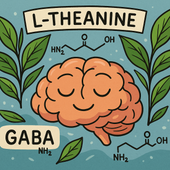
L-Theanine and GABA: Natural Calm for Parkinson’s-Related Anxiety
Anxiety in Parkinson’s often feels overwhelming — a constant inner tension that affects both body and mind. 🌿 This article explores how L-theanine and GABA, two natural compounds that promote relaxation without sedation, can help restore balance, ease restlessness, and calm the nervous system for a more peaceful state of mind. 🌙
-
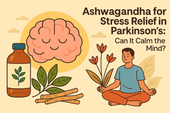
Ashwagandha for Stress Relief in Parkinson’s: Can It Calm the Mind?
Ashwagandha, the ancient Ayurvedic adaptogen, may offer powerful stress relief for people with Parkinson’s. 🌿 By regulating cortisol, calming the nervous system, and supporting dopamine balance, this natural herb helps ease anxiety, improve sleep, and promote emotional stability — restoring calm from the inside out. 🌙
-
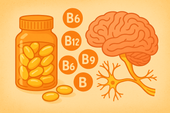
B Vitamins for Mood and Nerve Health in Parkinson’s Patients
B vitamins play a vital role in protecting the brain and nervous system in Parkinson’s. 🌿 From supporting dopamine production to reducing homocysteine and improving mood, these essential nutrients — especially B6, B9, and B12 — help stabilize emotions, boost energy, and preserve nerve integrity for better daily function and mental clarity. 💫
-
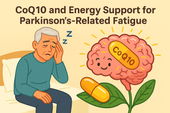
CoQ10 and Energy Support for Parkinson’s-Related Fatigue
Fatigue in Parkinson’s goes far beyond tiredness — it’s a deep cellular exhaustion. ⚡ CoQ10, a natural compound essential for energy production, may help restore vitality by supporting mitochondrial function and protecting brain cells from oxidative stress. Discover how CoQ10 can enhance energy, reduce fatigue, and improve overall resilience in Parkinson’s. 🌿
-
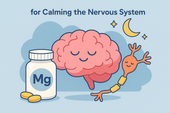
Magnesium for Calming the Nervous System in Parkinson’s
Magnesium is one of the most underrated allies for people with Parkinson’s. 🌿 This calming mineral supports the brain, relaxes tense muscles, and stabilizes the nervous system, helping reduce anxiety, restlessness, and sleep problems. Discover how magnesium nourishes dopamine pathways, protects neurons, and restores a sense of inner peace from within. 💫
-
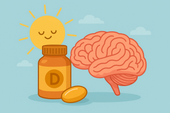
Vitamin D and Mental Health in Parkinson’s: Why Deficiency Matters
Vitamin D is more than a sunshine nutrient — it’s a key player in brain health and emotional balance for people with Parkinson’s. 🌞 This article explores how vitamin D influences dopamine, serotonin, and inflammation, and why deficiency can worsen depression, anxiety, and cognitive decline. Discover how restoring healthy levels can bring clarity, calm, and resilience back to daily life. 🌿
-

Omega-3s and Parkinson’s: Supporting Mood and Cognitive Clarity
Omega-3 fatty acids are among the most powerful nutrients for supporting brain health and emotional well-being in people with Parkinson’s. 🧠 This article explores how omega-3s strengthen neuronal membranes, improve dopamine and serotonin signaling, reduce inflammation, and promote cognitive clarity. Learn how these essential fats can help ease anxiety, lift mood, and protect your mind from oxidative stress naturally. 🌿
-
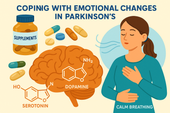
Coping with Emotional Changes in Parkinson’s: Supplements That Support Balance
Emotional changes like anxiety, depression, and irritability are common yet often overlooked symptoms of Parkinson’s disease. This article explores how supplements such as omega-3s, magnesium, and vitamin D can support mood regulation, while therapy and breathwork techniques help restore calm and emotional balance naturally. 🌿
-
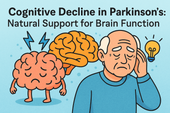
Cognitive Decline in Parkinson’s: Natural Support for Brain Function
Cognitive decline in Parkinson’s can affect memory, focus, and daily independence—but there’s hope. Understanding how the disease impacts brain chemistry opens the door to natural ways of support. From omega-3s and CoQ10 to mindfulness and exercise, you can nourish your brain, boost clarity, and slow decline through holistic care. 🌿🧠
-
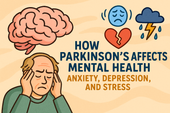
How Parkinson’s Affects Mental Health: Anxiety, Depression, and Stress
Dopamine is the brain’s spark of motivation—the chemical that fuels focus, pleasure, and drive. When dopamine levels are balanced, you feel inspired and alive; when they’re low, everything feels like an uphill climb. Understanding how dopamine works can help you support mental clarity, resilience, and emotional balance naturally. ⚡🧠
-
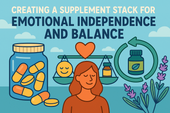
Creating a Supplement Stack for Emotional Independence and Balance
Biochemistry is the invisible language of life—how molecules, cells, and systems communicate to keep your body and mind in balance. From neurotransmitters shaping emotions to enzymes fueling energy, every process in your body reflects biochemical harmony. Understanding these reactions helps you see how nutrition, supplements, and emotions intertwine to support health, mood, and resilience. ⚗️🌿
-
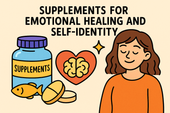
Supplements for Supporting Emotional Healing and Self-Identity
Biology is the bridge between mind and body—the science that explains how cells, hormones, and systems communicate to sustain life. It reveals how emotional states influence physical health, and how nourishment, rest, and movement keep us in balance. Understanding biology helps us reconnect with our natural intelligence and live in harmony with ourselves and the world. 🌿🔬
-
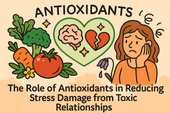
The Role of Antioxidants in Reducing Stress Damage from Toxic Relationships
Biology is the study of life in motion—the intricate dance between cells, systems, and the natural world. From DNA replication to neurotransmitter flow, every process in the human body reflects the intelligence of life adapting and evolving. Understanding this harmony helps us appreciate how nutrition, stress, and environment shape our health and emotional balance. 🌿🔬
-
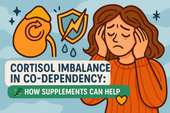
Cortisol Imbalance in Co-Dependency: How Supplements Can Help
Cortisol is the body’s main stress hormone—essential for energy and focus, yet harmful when chronically elevated. When life feels like constant pressure, cortisol imbalance can trigger fatigue, anxiety, and mood swings. Learning how to restore balance through rest, nutrition, and the right supplements can help you rebuild calm, clarity, and resilience from the inside out. 🌿💫
-
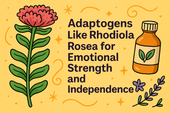
Adaptogens Like Rhodiola Rosea for Emotional Strength and Independence
Adaptogens are nature’s stress-balancing herbs—plants like Rhodiola, Ashwagandha, and Holy Basil that help your body adapt to emotional and physical pressure. They don’t numb or overstimulate; they teach your system how to find calm and stability again. By restoring balance to your hormones, energy, and mood, adaptogens nurture emotional resilience and grounded strength. 🌿✨
-
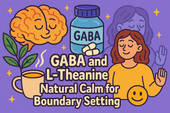
GABA and L-Theanine: Natural Calm for Boundary Setting
Anxiety can feel like a storm inside your mind—constant tension, overthinking, and the inability to relax even when you’re safe. But beneath the chaos, your body is simply trying to protect you. Learning to calm anxiety starts with understanding how your brain and nervous system respond to stress—and how to gently guide them back to peace. 🌿💫
-
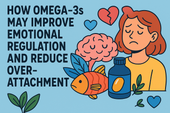
How Omega-3s May Improve Emotional Regulation and Reduce Over-Attachment
Inflammation isn’t just about sore joints or fatigue—it’s also a hidden driver of mood swings, anxiety, and emotional burnout. When chronic stress or poor diet keep the body inflamed, the brain’s chemistry changes, making calm harder to access. Learning how to reduce inflammation through nutrition, rest, and mindful living helps restore balance from the inside out. 🌿💫
-
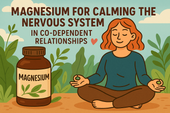
Magnesium for Calming the Nervous System in Co-Dependent Relationships
The nervous system is the body’s communication network, linking your mind and organs through a delicate web of electrical signals. It controls everything from emotional responses to muscle movement—and when it’s overwhelmed by chronic stress or anxiety, balance is lost. Learning how to calm and nourish your nervous system through nutrition, mindfulness, and rest can restore peace and emotional stability. 🌿💫
-
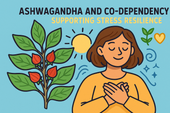
Ashwagandha and Co-Dependency: Supporting Stress Resilience
Stress is more than a feeling—it’s a full-body signal that your system is overwhelmed. When the mind races and the body tenses, your hormones, breathing, and focus all shift into survival mode. Chronic stress doesn’t just affect emotions—it reshapes your nervous system, drains your energy, and clouds your clarity. Learning to understand and manage stress gently is the first step toward peace, balance, and true recovery. 🌿💫
-

Why Co-Dependency Feels Draining: Adrenal Fatigue and Supplements That Help
The adrenal glands are small but powerful organs that sit above your kidneys, acting as your body’s built-in stress managers. They produce hormones like cortisol and adrenaline that help regulate energy, mood, and resilience. When they’re overworked from chronic stress or emotional exhaustion, fatigue and imbalance follow. Supporting adrenal health naturally can help restore calm, energy, and hormonal balance. 🌿⚡
-

The Link Between Anxiety, Co-Dependency, and Natural Support
Anxiety feels like living in constant alert mode—your heart races, your thoughts loop, and your body can’t find peace. It’s the nervous system’s way of preparing for danger, even when none exists. Understanding what’s happening in your mind and body is the first step toward calming the storm and restoring balance. 🌿💫
-

Supplements That Support Dopamine and Serotonin in Co-Dependent Patterns
Serotonin is the neurotransmitter of calm, confidence, and contentment. When it’s balanced, you feel peaceful and emotionally grounded. When it’s low, anxiety, mood swings, and emotional dependence take over. By understanding serotonin’s role in emotional health—and how to support it naturally—you can rebuild inner stability, improve relationships, and cultivate lasting happiness from within. 🌞💫
-

How Emotional Exhaustion in Codependency Impacts the Nervous System
The nervous system is the body’s communication network, connecting the brain to every organ and muscle. It regulates stress, mood, and emotion through a delicate balance of electrical and chemical signals. When overwhelmed, it can become dysregulated—leading to fatigue, anxiety, and emotional imbalance. Understanding how to calm and strengthen the nervous system is key to healing from chronic stress and emotional burnout. ⚡🌿
-

What Is Co-Dependency? The Role of Brain Chemistry and Stress
Stress is more than a feeling—it’s a full-body experience that begins in the brain and ripples through every cell. When cortisol surges and the nervous system stays on alert, your body can’t rest or recover. Over time, this constant tension affects energy, focus, mood, and even immune health. Understanding stress chemistry is the first step toward breaking free from burnout and finding calm again. 🌿
-

Creating a Supplement Stack for Motivation, Energy, and Anti-Procrastination
Motivation is the fuel behind every meaningful achievement—but it’s not just about willpower. It’s a mix of mindset, brain chemistry, and momentum. When energy, focus, and purpose align, action feels natural instead of forced. Learn how to harness motivation as a daily state, not a fleeting feeling.
-

Supplements for Building Consistency and Reducing Chronic Procrastination
Biochemistry is the bridge between biology and chemistry—the science of life at the molecular level. It explains how nutrients, hormones, and neurotransmitters interact to create energy, thought, and emotion. From brain function to muscle movement, biochemistry reveals the invisible processes that sustain health, balance, and vitality.
-

GABA and Procrastination: Supporting Calm Focus for Productivity
GABA is the brain’s natural calming messenger—a neurotransmitter that helps slow mental overactivity and ease stress. When GABA levels drop, focus fades, anxiety rises, and procrastination becomes more likely. By supporting GABA through nutrition, lifestyle, and supplements, you can restore calm clarity, improve focus, and take action with steady, balanced energy.
-

Ashwagandha and Procrastination: Lowering Stress to Improve Action
Science is the language of curiosity and discovery. It helps us understand the hidden patterns behind life, energy, and the universe. Through experimentation and critical thinking, science connects imagination to evidence—turning questions into knowledge. Whether through microscopes, molecules, or minds at work, science represents our endless pursuit of truth and innovation.
-

Neurotransmitters and Motivation: Supplements That Support Drive and Focus
Supplements can do more than boost physical health—they can also enhance mental clarity, focus, and motivation. Nutrients like omega-3s, magnesium, B vitamins, and adaptogens help balance neurotransmitters, stabilize mood, and support brain energy. When combined with good sleep, nutrition, and mindful habits, they can transform how your brain performs under stress.
-

How Stress Hormones Like Cortisol Fuel Procrastination (and What Helps)
Blood sugar isn’t just about physical health—it directly impacts focus, mood, and motivation. When glucose levels spike and crash, energy and attention do the same, fueling procrastination and brain fog. Learning how to stabilize blood sugar through balanced meals, mindful habits, and key nutrients helps keep your mind steady, focused, and ready to act.
-

Brain Fog and Procrastination: Supplements for Mental Clarity
Brain fog can turn even simple tasks into mental hurdles. When your thoughts feel slow and unclear, procrastination often follows—making focus and productivity seem impossible. This article explores the biochemical and lifestyle causes of brain fog and reveals the most effective supplements for restoring mental clarity, focus, and sustained energy.
-

The Link Between Low Energy and Procrastination: Can Supplements Help?
Neurochemistry shapes how we think, feel, and act. When neurotransmitters like dopamine, serotonin, and GABA fall out of balance, it can lead to fatigue, anxiety, or lack of motivation—fueling procrastination and low mood. Understanding the brain’s chemical communication system helps us find ways to restore focus, calm, and emotional stability through nutrition, mindfulness, and targeted supplements.
-

Why Do We Procrastinate? The Role of Dopamine and Supplements That Support It
Dopamine is the brain’s motivation messenger—the chemical that fuels focus, reward, and drive. When dopamine levels drop, even simple tasks can feel impossible to start. This article explores how dopamine shapes procrastination, motivation, and mental energy, along with natural supplements and daily habits that help restore balance and get things done.
-

Phosphatidylserine and Stress Reduction for People with BDD
Stress is more than a mental state—it’s a full-body experience that affects hormones, brain chemistry, and emotional balance. For people with Body Dysmorphic Disorder (BDD), constant tension and worry about appearance can overload the nervous system. Learning how stress works and finding ways to calm it is key to breaking the cycle of anxiety and self-criticism.
-

How Antioxidants Like Vitamin C & E Support Mental Health in BDD
Antioxidants are the body’s natural defense against stress and inflammation. For people with Body Dysmorphic Disorder (BDD), oxidative stress can worsen fatigue, anxiety, and emotional imbalance. Nutrients like Vitamin C and E help protect brain cells, boost neurotransmitter function, and support a calmer, clearer mindset—building a stronger foundation for recovery.
-

Ginkgo Biloba and Memory Support for BDD Recovery
Emotional regulation is the foundation of healing from Body Dysmorphic Disorder (BDD). When the nervous system stays in constant overdrive, even small stressors can trigger self-critical spirals. Learning to calm emotional reactivity helps restore clarity, confidence, and a sense of inner balance. By blending mindfulness, nervous system support, and self-compassion, you can retrain your brain to respond—not react—to emotion.
-

Alpha GPC and Cognitive Function in Body Dysmorphic Disorder
Mental fatigue can feel like your brain has hit a wall—thoughts slow down, focus fades, and motivation disappears. For people with Body Dysmorphic Disorder (BDD), chronic overthinking, emotional stress, and constant self-evaluation can deplete mental energy even further. Understanding what causes this cognitive exhaustion is the first step toward recovery—through rest, balanced nutrition, and targeted brain-supporting supplements.
-

N-Acetyl L-Tyrosine and BDD: Supporting Mental Clarity
Chronic stress doesn’t just affect your mood—it reshapes your brain chemistry, weakens focus, and fuels the obsessive thought loops common in Body Dysmorphic Disorder (BDD). Over time, constant cortisol elevation drains mental energy and emotional balance. Learning to recognize and manage chronic stress is essential to restoring mental clarity, self-compassion, and resilience.
-

Chamomile and Lavender for Calming Obsessive Body Image Thoughts
The nervous system is the command center of our emotional and physical world—and in Body Dysmorphic Disorder (BDD), it often operates in overdrive. Understanding how the brain and body communicate under stress reveals why intrusive thoughts feel uncontrollable. Learning to regulate the nervous system through calm practices, nutrition, and supplements helps restore inner balance and emotional safety.
-

Adaptogens for Body Dysmorphic Disorder: Rhodiola, Ginseng, and More
Rhodiola rosea, often called the “golden root,” is an adaptogenic herb renowned for boosting stress resilience and mental endurance. For individuals with Body Dysmorphic Disorder (BDD), Rhodiola may help reduce fatigue, regulate cortisol, and enhance emotional balance. By supporting both mind and body, this powerful plant promotes calm focus, improved mood, and renewed energy to face daily challenges.
-

B Vitamins for Stress Resilience in BDD: Rebuilding Calm from Within
Biochemistry is at the heart of every thought, emotion, and reaction we experience. In Body Dysmorphic Disorder (BDD), chemical imbalances in neurotransmitters like serotonin, dopamine, and GABA can amplify stress and distort self-perception. Understanding the biochemistry behind mood and stress regulation offers a path toward healing—bridging the gap between emotional experience and the body’s molecular balance.
-

Melatonin and Body Dysmorphic Disorder: Restoring Healthy Sleep Patterns
Melatonin, the body’s natural sleep hormone, plays a vital role in helping people with Body Dysmorphic Disorder (BDD) restore healthy sleep cycles. When anxiety and obsessive thinking interfere with rest, melatonin levels often drop, leading to more emotional reactivity and distorted self-perception. This article explores how melatonin works, why BDD disrupts it, and how natural supplementation—combined with mindful routines—can help the brain and body finally find calm at night.
-

Sleep Struggles with BDD: Supplements for Rest and Recovery
When you’re living with Body Dysmorphic Disorder (BDD), restful sleep can feel impossible—but the right supplements can help reset your body’s natural rhythm. From magnesium and L-theanine to 5-HTP and ashwagandha, these nutrients support relaxation, lower cortisol, and enhance melatonin production. This article explores how supplements can calm the mind, ease nighttime anxiety, and promote true restorative sleep for emotional and physical recovery.
-

5-HTP and Serotonin Balance: Could It Help with Body Dysmorphic Disorder?
Anxiety can feel like a storm inside the mind—restless, overwhelming, and hard to control. In people with Body Dysmorphic Disorder (BDD), anxiety often fuels obsessive thoughts and self-criticism, creating a painful cycle of worry and self-doubt. This article explores the biological roots of anxiety, the role of neurotransmitters like serotonin and GABA, and how natural strategies such as mindfulness, supplements, and nervous system regulation can restore calm and mental clarity.
-

Can Ashwagandha Help Ease Stress and Anxiety in Body Dysmorphic Disorder?
Neurotransmitters like serotonin, dopamine, GABA, and acetylcholine are the chemical messengers that shape how we think, feel, and react to stress. In Body Dysmorphic Disorder (BDD), imbalances in these neurotransmitters can amplify anxiety, obsessive thinking, and emotional distress. This article explores how restoring healthy brain chemistry through nutrition, supplements, and mindfulness can help bring clarity, calm, and emotional stability.
-

L-Theanine for BDD: Finding Calm in the Mind
Neurochemistry plays a central role in how we think, feel, and see ourselves. For those living with Body Dysmorphic Disorder (BDD), imbalances in neurotransmitters like serotonin, dopamine, and GABA can intensify anxiety, obsessive thoughts, and emotional distress. This article explores how regulating brain chemistry through supplements, mindfulness, and lifestyle changes can bring the nervous system back into harmony and restore inner calm.
-

Omega-3 Fatty Acids and Body Image Disorders: Supporting Emotional Health
Omega-3 fatty acids do far more than support heart health—they nourish the brain, stabilize mood, and may ease the emotional turbulence tied to body image disorders like BDD. This in-depth article explores how omega-3s regulate serotonin, dopamine, and inflammation, helping individuals reduce obsessive thoughts and rebuild self-acceptance. It also connects nutrition to therapy, mindfulness, and nervous system balance for holistic emotional healing.
-

Magnesium and BDD: Calming an Overactive Nervous System
Magnesium plays a crucial role in calming an overactive nervous system—something people with Body Dysmorphic Disorder (BDD) struggle with daily. This article explores how magnesium supports relaxation, emotional regulation, and stress reduction while diving into the science behind its connection to brain chemistry. It also examines how combining magnesium supplementation with therapy and breathwork can help rebalance the body’s stress response, reduce obsessive thought patterns, and promote lasting nervous system calm.
-

The Gut-Brain Axis and BDD: Why Probiotics Might Matter
The gut and brain are constantly in conversation — and that dialogue may shape how you experience Body Dysmorphic Disorder. By nurturing your microbiome with probiotics, prebiotics, and gut-healing nutrients, you can help rebalance serotonin, calm anxiety, and restore emotional stability from within 🧠🦠.

















































